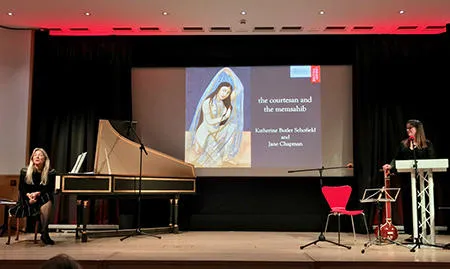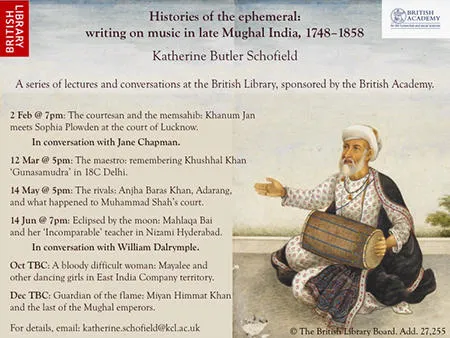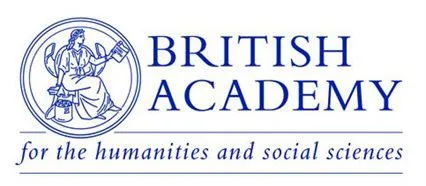Histories of the Ephemeral: Writing on Music in Late Mughal India

Image Credit: Fred Moehn
In 2018 Katherine Butler Schofield was awarded a British Academy Mid-Career Fellowship for a series of public lectures and conversations at the British Library, “Histories of the Ephemeral: Writing on Music in Late Mughal India, 1757–1858.”
Follow on Twitter: @katherineschof8
How can we recapture the ephemeral experience of music once the last sound has died away?
Can the written testimony of historical listeners bring that experience back to life—just a little?—and tell us things about social and political history we could never otherwise know? Or was late Mughal writing on music merely “the sibilant scratches of a broken pen,” as Sher Khan Lodi would have it?
Through the lives of six forgotten musicians drawn from the British Library’s magnificent South Asia collections, Katherine Butler Schofield explores this key philosophical question, while revealing the inner histories of a courtly culture turned upside down during the final tumultuous century of Mughal rule in India, c.1757–1858.
2 February 2018 — The Courtesan and the Memsahib: Khanum Jan Meets Sophia Plowden at the Court of Lucknow. In conversation with harpsichordist Jane Chapman.
12 March 2018 — The Maestro: Remembering Khushhal Khan ‘Gunasamudra’ in Eighteenth-Century Delhi.
14 May 2018 — The Rivals: Anjha Baras Khan, Adarang, and What Happened to Muhammad Shah’s Court.
14 June 2018 — Eclipsed by the Moon: Mahlaqa Bai and her ‘Incomparable’ Teacher in Nizami Hyderabad. In conversation with writer William Dalrymple.
22 October 2018 — A Bloody Difficult Woman: Mayalee and Other Dancing Girls in East India Company Territory.
3 December 2018 — Guardian of the Flame: Miyan Himmat Khan and the Last of the Mughal Emperors.

Programme Summary
This project tells the forgotten stories of Indian musicians, patrons, and the courtly culture they inhabited during the tumultuous period of transition from Mughal to British rule, drawing in large part on the magnificent collection of South Asian materials held at the British Library in London. Music scholars have previously thought that there are no written sources for this period because musicians were “illiterate” and passed down their knowledge secretly by word of mouth. But it turns out this is not the case. In a recently completed project I documented an enormous indigenous archive of writings on Hindustani music c.1700–1880, most of which has been overlooked.
In this new project, through a series of public lectures, conversations, podcasts, and webinars culminating in a new monograph, I aim to bring this archive to public attention; to demonstrate ways to read these diverse writings in and of themselves and in conversation; and in doing so, to tease out of them stories of musical culture that don’t just provide us with much needed new histories of music and listening in late Mughal India, but also of wider events in the critical period of regime change from Plassey to the Uprising.
Programme
Through a series of public lectures, conversations and webinars culminating in a monograph, this project presents the first music history of the late Mughal period that shows in detail how a key Mughal cultural field responded to the political, economic and intellectual upheaval of this critical transitional era in Indian history—while answering a key philosophical question, for the Mughals and for us: how can we recapture a sense of the musical moment once it is over?
In his 1691 biography of poets, the Mughal nobleman Sher Khan Lodi wrote of Indian music that “it is impossible to capture its essence in pen and ink on the surface of a page.” This expresses a universal philosophical problem in music. Even in Europe, where a written score is both model for and model of a musical performance, the visceral emotional experience of being there, in the moment of its sounding, is lost forever once the last note has died away. If music is what was sounded and embodied and experienced, then writing on music is always impossible.
The problem is acute, though, for historical studies of North Indian art music, whose current fundamentals coalesced under Mughal rule (1526–1858). Scholars have long highlighted the tradition of writing Indian music theory in Sanskrit. Generally, though, it has been shown that this tradition attenuated in the North around 1700, and had to be revived in the late nineteenth century. In the intervening years—which, crucially, coincided with the tumultuous transition from Mughal to British rule—the consensus is that the North Indian musical system was transmitted, not in writing, but by word of mouth within household guilds of supposedly illiterate hereditary musicians. This apparent shift of musical knowledge into the oral/aural domain c.1700, coupled with ethnomusicologists’ overwhelming interests not in the written but in what is embodied and performed, has created a widespread assumption that there are few if any writings on Hindustani music between the late seventeenth century and the rise of printed vernacular treatises in the late nineteenth.
Unfortunately, the period 1757–1858 was also one of the most significant periods of change for Hindustani music, in which new forms, instruments, performers and patrons asserted themselves on a fiercely competitive interregional stage. The current consensus that this was a “silent” period has thus left a critical lacuna in our understanding of Hindustani music’s history that has been patched only partially with the oral histories, older repertoire, and remembered genealogies of modern musicians.
My recently completed ERC project demonstrated unequivocally that this consensus is wrong: there is in fact an enormous, rich archive of writing on music for the period 1700–1880 in North Indian languages, particularly Persian and Brajbhasha/Hindavi. These sources have languished in the archives largely unnoticed, and the handful that are known have been very underutilised. Many of these texts were written by the very musicians we have thought were “illiterate”. To add to this, the period c.1770–1830 was when British interest in the Indian arts was at its peak. The manuscript and painting collections, private papers and India office records of the colonisers illuminate corners that the brighter lights of the Indian materials don’t reach. This substantial archive dramatically changes what is possible to write about the history of music in North India.
Although it draws on the ERC archive, the research of this project is a new departure. The first objective of this new project is to use the fascinating stories of six forgotten musicians as a way into the different types of “writing on music” available for music history in Persian, English and North Indian vernaculars; and to show how revelatory musical stories can be disinterred from genres as diverse as Persian tazkiras (biographical compendia), illustrated ragamalas, “ethnographic” texts and East India Company account books. The second is to investigate the act of “writing on music” more deeply. In writing on music, these musicians, connoisseurs and travellers were writing their own “histories of the ephemeral”. What did that entail for late Mughal and early colonial men and women? What did they think was important to write down? What changes to the musical field are embedded in these texts, and explain the rise and fall in this period of new and old genres of writing on music?
Finally, I aim to show how we might write “histories of the ephemeral” from such sources. Music in the Mughal empire existed to “charm the emotions”; music was sound plus emotional response plus search for meaning. In choosing to focus on the lives of long-dead performers and those who listened to them, I hope to show that although we have lost the sound of late Mughal India, writing on music not only gives us qualified access to what music meant and felt like then to those who loved it—but can also, sometimes, enable us to feel those things too.
Our Partners

British Academy for the humanities and social sciences

